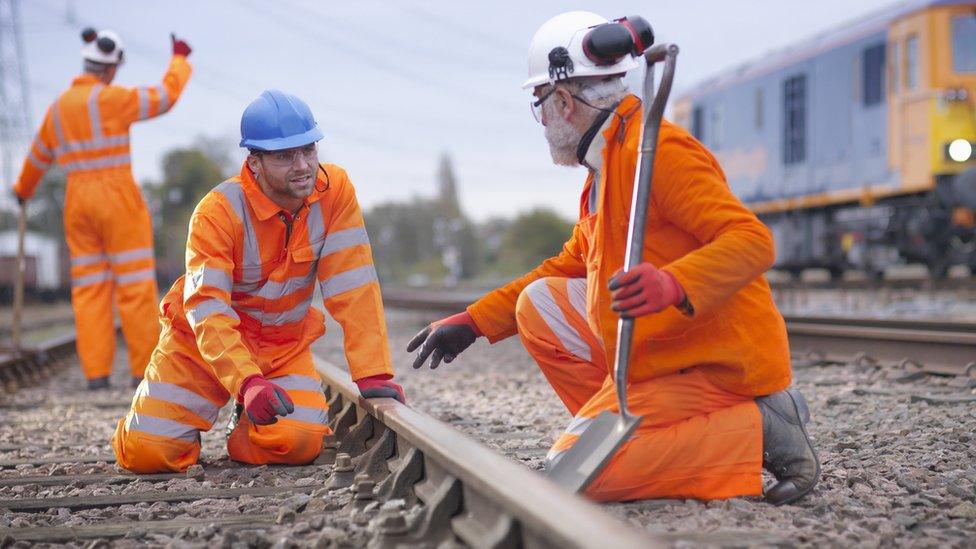Unions branded selfish by No 10 over June rail strike plans
- Published

Unions have been branded selfish by No 10 over rail strikes which threaten major disruption to passengers.
The RMT Union said it will shut down the country's railway network on 21, 23 and 25 June after talks over pay and redundancies fell through.
Downing Street warned the plans would inflict pain on passengers and cause disruption and said it was determined to make railways more efficient.
But RMT hit back saying the government itself was being selfish.
Both train operators and the union have said they want more talks to avoid the strikes.
If industrial action goes ahead, more than 40,000 staff from Network Rail and 13 train operators are expected to take part in what is dubbed the "biggest rail strike in modern history".
On the first day of the planned strike on 21 June, London Underground RMT workers plan to walk out in a separate dispute over pensions and job losses.
On Wednesday, Unite members who work at Transport for London and London Underground announced they will join their RMT member colleagues in walking out on 21 June.
The strikes fall during music and sporting events including the Glastonbury Festival and an England cricket Test match against New Zealand, and are expected to affect thousands of passengers.
The action will leave around a fifth of mainline rail services running on the strike days, but due to each walk out being 24 hours long, disruption is expected to spill over to non-strike days leading to a week of disruption.
According to the Department for Transport, the average salary rail worker salary is £44,000. This is more than the median pay of other public sector workers, such as nurses (£31,000), teachers (£37,000), and care workers (£17,000).
However, RMT said the salary figure was "unrepresentative" as it included higher-earning train drivers, who did not take part in the ballot as most are part of a different union. The union claims its members earn £33,000 a year on average.
'Reckless and wanton'
The Prime Minister described the planned strike as "reckless and wanton" and demanded condemnation of the strike from the Labour Party in Prime Minister's Questions.
A No 10 source said the move was "thoroughly irresponsible" and warned it would inflict "pain and economic disruption on their fellow citizens in really tough times".
However, Mick Lynch, secretary general of the RMT union, hit back at the government saying they were "experts at being selfish and irresponsible".
He told the BBC his members needed a pay deal, job security and "decent terms and conditions".
"The government have the key to unlock that," he added.
Mr Lynch claimed Network Rail had told union reps they were planning to cut 3,000 maintenance jobs out of 11,000, which he said would pose safety risks.
But Network Rail insisted no proposals were on the table, talks were under way about modernising maintenance and how compulsory redundancies could be avoided. It rejected claims it would do anything to compromise safety.

Strikes divide opinion
Graham Purdy, from Cramlington in Northumberland is one of many learning that his plans will be affected if the June strikes go ahead.
He and his wife have tickets to see the Eagles at Murrayfield, Edinburgh, on 22 June and to a Barry Manilow concert the following day in Glasgow.
The 63-year-old, whose travel plans involve his first overnight stay since the pandemic, said he was against the strike and now faced having to drive and book car parking he may not have to use, but pay for.
"It's annoying and frustrating," he said. "I've worked all my life in the construction industry; If you don't like what they are paying, you get another job, don't withdraw your services."

Alastair Webster says he sides with the rail workers
However, Alastair Webster, from Birmingham, said he supported the stance of the rail workers, despite his plans to go on holiday being "massively" disrupted by the proposed action.
"There has been under-investment and mismanagement, millions wasted on HS2. People want the railways nationalised," he said.
"I'd always side with the people on the coal face. Even if its massively disruptive I support the strikers. With the cost of living crisis and everything else the government needs to constructively engage with them."

Steve Montgomery, of the Rail Delivery Group, said the industry body was "extremely disappointed" with the prospect of strike action. "It's really important we ask RMT to get back round the table," he said.
He said that the industry had received £16bn in subsidies over the pandemic, but that level of funding could not continue.
"We have to look how we can reform," he said.
Rail firms "are looking at all options" to modernise, including job losses, he said.
The industry group said rail industry revenue is currently at 82% of 2019 levels, which is the same as a £38m shortfall on pre-Covid revenue levels every week.
Transport Secretary Grant Shapps said Covid "changed travel habits" - with 25% fewer ticket sales and the taxpayer stepping in to keep the railways running at a cost equivalent to £600 per household.

Which lines will be affected by the strike?
People working for 13 train operating companies, which each run services in different parts, external of the country, will take part in the strike. These are:
Chiltern Railways
Cross Country Trains
Greater Anglia
LNER
East Midlands Railway
c2c
Great Western Railway
Northern Trains
South Eastern Railway
South Western Railway
TransPennine Express
Avanti West Coast
West Midlands Trains
In addition, workers at Network Rail, which maintains the railways throughout Britain, also voted to strike. So the impact of the action would be felt across England, Scotland, and Wales.

However, Mr Lynch said railway firms "can easily afford a pay rise for our members, it'll just mean they have to cut back on their profits".
"They are ripping off the passenger, they are ripping off the taxpayer. The government needs to fund the railway properly, and we need the companies to give up some of their profits to give our members a pay rise," he added.
But the Rail Delivery Group spokesman said the RMT was "using inflated figures" on profits to "disguise the real issue".
Mr Lynch said the union doesn't want disruption for thousands of commuters, but had been talking to rail firms for two years trying to get pay deals.
"We've got another two weeks before this action starts. There's plenty of time to get proposals forward," he added.
Additional reporting by Kris Bramwell and the BBC's UGC team.


How will you be affected by the planned rail strikes? Tell us by emailing: haveyoursay@bbc.co.uk, external
Please include a contact number if you are willing to speak to a BBC journalist. You can also get in touch in the following ways:
WhatsApp: +44 7756 165803, external
Tweet: @BBC_HaveYourSay, external
Or fill out the form below
Please read our terms & conditions and privacy policy
If you are reading this page and can't see the form you will need to visit the mobile version of the BBC website to submit your question or comment or you can email us at HaveYourSay@bbc.co.uk, external. Please include your name, age and location with any submission.

- Published7 June 2022

- Published9 May 2024
